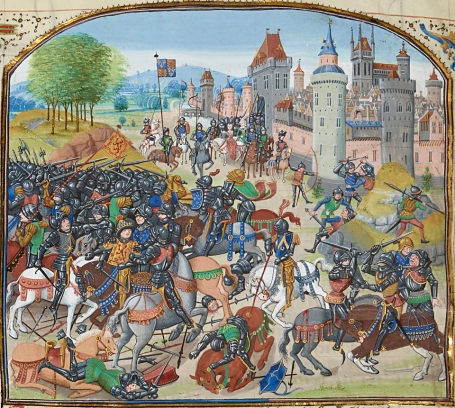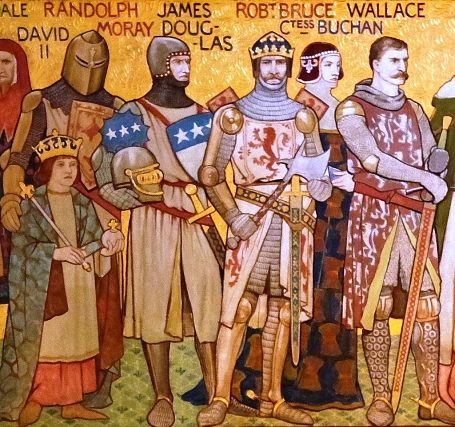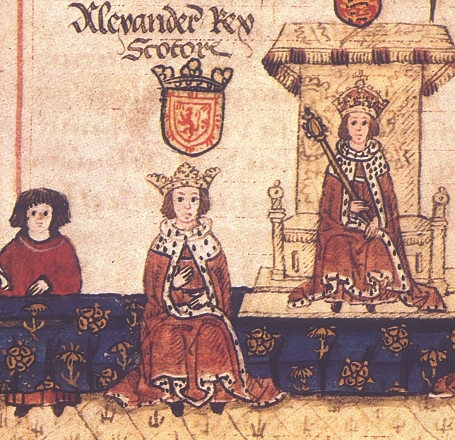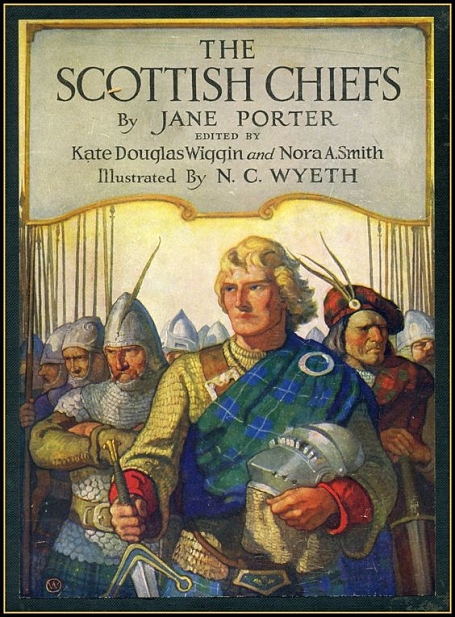The Life and Heroick Actions of the Renoun'd Sir William Wallace,
General and Governour of Scotland
by William Hamilton of Gilbertfield
Book II, Chapter III
How WALLACE was imprisoned in Ayr, and escaped.
Herrings and Water, for his Nourishment,
And such sad Stuff to Wallace they present:
Instead of what was wholesome cleanly Food,
Got the Refuse of ev'ry Thing was Good.
Thus in the Prison languishing he lay,
Till Death was pictur'd in his beauteous Clay.
His vital Spirits almost spent and gone,
Then to Jehovah made his piteous Moan:
Confess'd his Sins, most humbly then implor'd
Mercy thro' CHRIST, his Saviour and LORD.
Then said, "My GOD, O please for to receive
My Soul and Body, I thee humbly crave.
For if Relief thou do not quickly send,
My Days in Prison here I'll shortly End.
Please to prolong my Days O GOD to me,
Since my Belief is wholly upon thee:
Which by thy Grace thou graciously hast wrought,
And me from Hell by thine own Blood hast bought.
Why wilt thou give thy Handy-work to those,
Who are our Nation's and my mortal Foes.
And who maliciously this Land abhor,
Would me destroy with many others more.
O bruckle Sword, thy Mettal was not true,
Thy frushing Blade, me in this Prison threw:
To English Men, ov'r little Harm thou's done,
Of gallant Scots who kill'd so many a one.
Of us indeed they have not kill'd a few,
My valiant Father, and bold Brother too,
Were at Lochmabane kill'd by South'ron,
But Death resisted sure can be by none.
This Ancient Kingdom, LORD do thou relieve,
From English Thraldom and Deliverance give.
Tho' now, O LORD, my Pow'r be gone indeed,
Yet King of Kings help thou and send Remeed.
Of worldly Comforts now I take my leave,
I shall be shortly where I shall not grieve:
Thus heartily to all I bid adieu,
None other Gift have I to leave you now."
Adieu Wallace, that was both strong and stout,
Long in this Prison thou must ly no doubt:
Now all thy noble Kindred brave and bold
Thy Freedom purchase cannot, not with Gold.
Thy tender Mother that in Pain thee bore,
In her soft Arms shall ne'er inclose thee more;
How seemly was thou, with thy Sword and Shield,
When thou kill'd Numbers on the bloody Field.
Complain ye Poor, with Rev'rence tell your tale,
Complain to Heavens, with Words that cannot fail:
Lift up your Voice to the great GOD above,
That's full of Mercy, Pity, and of Love.
Complain for him that sits in dismal Cells,
And in the melancholly Dungeon dwells:
With Grief and Pain; which he scarce can endure,
Pray for's Relief, to the great GOD of Pow'r.
Complain ye Birds that once were blyth and glad,
Now change your Notes, and hang thy drooping Head.
Complain ye Lords, complain ye Ladies bright,
Complain for him that worthy was and wight.
Complain ye Men of War in mournful Song
For him, of Saxon's Sons that suffers Wrong.
Complain for him, who lyes both Day and Night,
In Prison, for maintaining Scotland's Right,
Complain for him who did most frequently,
Sound up the Triumphs of our Victory.
What shall I say of the brave Wallace more,
A cruel Flux in Prison, and a sore,
Did then almost reduce him to last Breath,
And left him gasping in the Jaws of Death.
The Jaylor now's commanded with great Aw,
To bring him to the Sentence of their Law.
Who, when he view'd him, to his great surprise,
Thought Death already had shut up his Eyes.
In haste returns, and does report the News,
That he had paid both Law and Prison-Dues.
Perswaded thus, that he was very dead,
For Wallace now there was no more remeed.
Being concluded, by Consent of all,
To throw him quickly ov'r the Castle-Wall.
The ballad, The Life and Heroick Actions of the Renoun'd Sir William Wallace, General and Governour of Scotland, by William Hamilton of Gilbertfield, 1722, is in the public domain.

The Kingdom of England and the Kingdom of Scotland fought dozens of battles with each other. They fought typically over land, particularly Berwick-Upon-Tweed, and the Anglo-Scottish border frequently changed as a result. Read more at Wikipedia.

The First War of Scottish Independence was the initial chapter of engagements in a series of warring periods between English and Scottish forces lasting from the invasion by England in 1296 ... Read more at Wikipedia.

Edward I (1239-1307), also known as Edward Longshanks and the Hammer of the Scots, was King of England from 1272 to 1307. Read more at Wikipedia.

Digitized version of The Scottish Chiefs, by Jane Porter, a novelization published in 1921 by Charles Scribner's Sons, about William Wallace and the First Scottish War of Independence. Read online at archive.org.